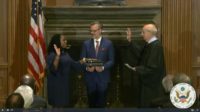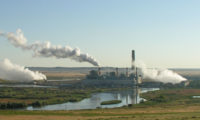The U.S. Supreme Court on Feb. 28 heard oral arguments in a group of clean-air cases that pitted power companies, the U.S. Environmental Protection Agency and environmental advocates against coal industry interests and several Republican-led states, including West Virginia.
Both sides said the case could have sweeping ramifications on the U.S. power sector, federal agencies’ ability to regulate it and the overall economy.
“This is one of the most important administrative law and separation of powers cases in quite some time,” Patrick Morrisey, West Virginia attorney general, said on Feb. 28. “This case will determine who decides the major issues of the day: unelected bureaucrats or Congress, which is comprised of those elected by the people to serve the people.”
But the line of questioning the justices took suggests they may be reluctant to upend the bedrock assumption that EPA has the right to regulate greenhouse gases, which was established in 2007 in the case, Massachusetts v. EPA.
Michael Gerrard, founder and director of Columbia University’s Sabin Center for Climate Change Law, says that prior to oral arguments, “there was a lot of concern [among environmental groups] that justices could rule very broadly, and a great deal was at stake. I don’t think they are going to rule as broadly as feared on one side and hoped by the other.”
The nation’s high court agreed to hear the case after the U.S. Court of Appeals in Washington, D.C., vacated a Trump administration regulation in December 2020. That rule had repealed the Obama-era Clean Power Plan to reduce greenhouse gas emissions from stationary sources and replaced it with the more-limited Affordable Clean Energy rule.
Power companies, which supported EPA in the case, said they preferred the Obama rule because it gave them flexibility in complying with the requirements.
Making the Argument
West Virginia, several coal companies and other Republican-led states appealed to the Supreme Court, which agreed to hear the case last fall. In their arguments, the petitioners said the Clean Power Plan was an example of federal overreach that was not supported by the federal Clean Air Act, and in fact extended beyond the scope of what EPA could legally do.
This could trigger the “major questions” doctrine, a fairly technical legal concept that relates to transformational changes caused as a result of agencies regulating beyond their authorities.
Attorneys representing EPA and the power companies countered that because the Clean Power Plan was not reinstated, and because EPA is working on a proposed new regulation that won’t be released until later this year, it was too early even to consider the case before the court.
“It’s problematic to try and think about exercises of authority in an abstract way without a currently applicable regulation before you,” said U.S. Justice Dept. Solicitor General Elizabeth Preloger, arguing for the federal government.
In her rebuttal, Lindsay See, solicitor general for Charleston, W.Va., disputed Preloger’s assertions that the Clean Power Plan was not reinstated as a result of the D.C. appeals court ruling.
While the justices did not seem to want to overturn EPA’s authority to regulate greenhouse gas emissions, they asked numerous questions related to the major questions doctrine.
That could signal that they may be interested in establishing a clearer and broader statement about when it applies—which could place more limits on federal agencies, says Kirti Datla, director of strategic legal advocacy for Earthjustice. Pointing to questions from Chief Justice John Roberts, Justice Samuel Alito and others, she noted that “even they don’t seem to know when [the doctrine] applies.”
Three days prior to the oral arguments in the clean-air case, President Joe Biden announced that he would nominate Ketanji Brown Jackson to fill the seat held by retiring Justice Stephen Breyer. A former clerk to the justice, she also would be the first African-American woman to sit on the court.
Construction unions and Democrat-leaning groups praised the selection of Jackson, who joined the Washington appellate court last year, and before that, served on the U.S. District Court for the District of Columbia, beginning in 2013.
One construction industry source said that if Jackson is confirmed, her experience at the D.C. federal appeals court will be an asset because cases that deal with federal agencies and regulations tend to be brought to that court.
“Judges from that circuit come to the Supreme Court very well prepared to deal with a lot of the heavy regulatory issues,” said the source, who also notes that the basic conservative-liberal makeup of the court would probably not change. “It’s a 6-3 court; it’s going to stay a 6-3 court.”






